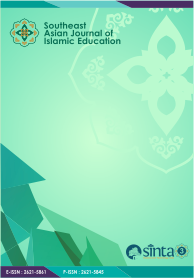The Impact of The Fourth Industrial Revolution on IIUM Student’s Motivation in Learning Islamic Education
Abstract
The Fourth Industrial Revolution has impacted several fields, including education. Along with the rapid development of technology, the education sector is also progressing to encourage this development. Students need to stay motivated in learning Islamic education subjects and make good use of all the technology presented by the Fourth Industrial Revolution. This study aimed to describe the impact of the Fourth Industrial Revolution on students’ motivation in learning Islamic Education in Malaysia, especially among students at the International Islamic University Malaysia (IIUM). This study used a survey approach. The survey is in the form of a questionnaire in google form to make it easily accessed by students. The sample for this research consisted of 51 International Islamic University of Malaysia students with a random sampling technique. The researcher analyzed the data in-depth and concluded the impact of the Fourth Industrial Revolution on the motivation of IIUM students in learning Islamic Education. The result of this study is that phenomenon of Islamic education in the Industrial Revolution cannot be separated from gadgets and smartphones. Over half of the respondents, with a percentage of 71%, strongly said that students are very enthusiastic about using smartphones to learn through digital resources because it is easy for them to access information so that they can learn a lot about Islamic Education through smartphones or the internet. Thus, it can increase their motivation to learn Islamic Education. Furthermore, the Fourth Industrial Revolution has had a positive impact on IIUM Student’s Motivation in learning Islamic Education.
References
Ahmadfadzli, N. (2002). Pusat Perkembangan Kurikulum Kementerian Pendidikan Malaysia. https://www.academia.edu/31031438/Pusat_Perkembangan_Kurikulum_Kementerian_Pendidikan_Malaysia
B. Uno, H. (2011). Teori Motivasi dan Pengukurannya Analisis di Bidang Pendidikan. Bumi Aksara.
Baenanda, L. (2019). Mengenal lebih jauh Revolusi Industri 4.0. Binus University.
Chang Da, W. (2018). Education in Malaysia Towards a Developed Nation. ISEAS Yusof Ishak Institute.
Chen, J. (2020). Industrial Revolution Definition: History, Pros, and Cons. Investopedia. https://www.investopedia.com/terms/i/industrial-revolution.asp
Chowdhury, M. (2018). Emphasizing morals, values, ethics, and character education in science education and science teaching. MOJES: Malaysian Online Journal of Educational Sciences, 4(2), 1–16.
Darajat, Z. (2020). Pendidikan Islam. PT Bumi Aksara.
Daunton. (2011). The British Industrial Revolution in Global Perspective, by Robert C. Allen. Victorian Studies, 53(4), 773. https://doi.org/10.2979/victorianstudies.53.4.773
Gleason, N. W. (Ed.). (2018). Higher Education in the Era of the Fourth Industrial Revolution. Springer. https://doi.org/10.1007/978-981-13-0194-0
Hamid, A. (2010). Islamic education in Malaysia. S. Rajaratnam School of International Studies Publication.
Hamid, A. F. A. (2010). Islamic Education in Malaysia: The Pre-Independence Era (Islamic Education in Malaysia, pp. 13–24). S. Rajaratnam School of International Studies. https://www.jstor.org/stable/resrep05898.5
Hashim, R. (2006). Pendidikan Islam di Malaysia: Dari pondok ke universiti. Jurnal Pendidikan Islam, 12(1), Article 1.
Hussin, A. (2018). Education 4.0 Made Simple: Ideas For Teaching. International Journal of Education and Literacy Studies, 6(3), 92. https://doi.org/10.7575/aiac.ijels.v.6n.3p.92
Ishak, H. A. (2022). Pendidikan Islam dan pengaruhnya di Malaysia. Dewan Bahasa dan Pustaka.
Kolandan, S. (2019). Industry Revolution 4.0 and Education System in Malaysia: Are We Ready for the Challenges? (pp. 252–264). https://doi.org/10.4018/978-1-5225-7832-1.ch015
Komarudin, D., Adnan, A., & Upe, A. A. (2018). The Effect of Smartphone Technology Development on Student Morality. International Journal of Nusantara Islam, 5(2), 142–153. https://doi.org/10.15575/ijni.v5i2.2048
Mat, D. (2015). Pendidikan Islam di Malaysia.
Ministry of Higher Education. (2015). Malaysia Education Blueprint 2015-2025 (Higher Education). https://www.moe.gov.my/menumedia/media-cetak/penerbitan/dasar/1207-malaysia-education-blueprint-2013-2025/file
Mohd Nor, M. R. (2012). Comparative Analysis on Emergence of Islamic Education in Malaysia and Bangladesh.
Muhammad, Y. (2018). Era Industri 4.0: Tantangan dan Peluang Perkembangan Pendidikan Kejuruan Indonesia. Universitas Negeri Makassar.
Nor, M. R. M. (2011). Sejarah dan Perkembangan Pendidikan Islam di Malaysia. At-Ta’dib, 6(1), Article 1. https://doi.org/10.21111/at-tadib.v6i1.547
Pratama, I. P., & Zulhijra, Z. (2019). Reformasi Pendidikan Islam di Indonesia. Jurnal PAI Raden Fatah, 1(2), 117–127. https://doi.org/10.19109/pairf.v1i2.3216
Slameto. (2014). Belajar dan faktor-faktor yang mempengaruhinya. PT Rineka Cipta.
Stokes, C. B. (2014). The Industrial Revolution. Khan Academy. https://www.khanacademy.org/humanities/big-history-project/acceleration/bhp-acceleration/a/the-industrial-revolution
Sugiyono. (2018). Metode Penelitian Kuantitatif Kualitatif dan R & D. Alfabeta.
Wahid, N., Hamid, H., Low, S., & Mohd Ashhari, Z. (2011). Malaysian Education System Reform: Educationists Perspectives. https://www.researchgate.net/publication/241064438_Malaysian_Education_System_Reform_Educationists_Perspectives

















